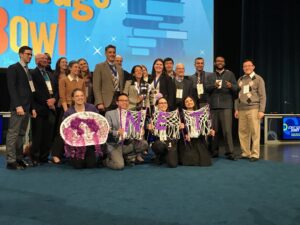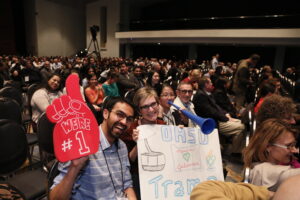
The University of Washington team members, Neutrophil NETs (2019), with their colleagues and cheering section and neutrophils undergoing NETosis (composed of poster board, glitter and shower poufs). (Click to enlarge.)
One of the most fun events at every annual meeting is the ACR Knowledge Bowl. In this quiz show-style trivia game, fellows form teams to compete for top prizes. There’s a charismatic host, a panel of esteemed judges and an auditorium packed with cheering spectators. Beyond the fun of competing against your peers from other institutions (some of whom travel from abroad to play), winners receive the glory, their names on a traveling trophy, and complimentary registration and housing for next year’s annual meeting.
As former Knowledge Bowl champions [Jean Liew and Joanna Marco, University of Washington, Seattle, Neutrophil NETs, 2018, 2019; and Guy Katz, Massachusetts General Hospital, Boston, IgGenerals, 2022], we are updating the ACR Knowledge Bowl playbook. A lot has changed since the physician editor of this magazine was on stage as a member of the University of Iowa’s three-peat championship team.
Are you a rheumatology trainee who thinks they could be the next ACR Knowledge Bowl champion? Read on.
How to Prepare
Assemble your team. The first thing an ACR Knowledge Bowl hopeful must consider is the application deadline. Application dates vary, so check the ACR Convergence website for details. Before you can apply, though, you need a team.
Teams comprise two fellows and one attending. A catchy team name is a must. Incoming rheumatology fellows are often inspired to play in the Knowledge Bowl, but if they wish to form or join a team, they need to be in contact with their co-fellows shortly after matching.
The application deadline for ACR Convergence 2023 is July 19 at noon EDT.
Gather your study materials. Once you’ve decided to apply for the Knowledge Bowl, the next step is to prepare. Studying for the Knowledge Bowl is not too different from studying for clinical care and the rheumatology board exam.
The first and most important resources to turn to, without a doubt, are your patients. Whenever you see a patient, whether they have lupus nephritis, giant cell arteritis or rheumatoid arthritis, take the time to refer to the landmark clinical trials, management guidelines and classification criteria that form the basis for your day-to-day clinical decision making. These are likely to show up as questions in the Knowledge Bowl. Download the ACR Guidelines and Criteria app for easy access and refer to it regularly.
Engage in your division’s Journal Club. This will keep you up to date on recent and landmark studies that frequently arise in the Knowledge Bowl question bank. Read the ACR’s peer-reviewed journals and The Rheumatologist. Doing so can translate to more points in the Knowledge Bowl—and let’s face it: It will make you a better rheumatologist.

The Massachusetts General Hospital team, House of DMARDs (2020), with their mascot, the narwhal. (Click to enlarge.)
While keeping up to date with the literature is critical, it does less to help with answering questions on esoteric topics, which may be uncommon in practice, but lead to popular Knowledge Bowl questions. Studying for these requires a more focused investment. Board preparation resources, such as Rheumatology Secrets, ACR CARE Questions and the University of Iowa Hawkeyes Rheumatology Question Bank—among many others—are great ways to get exposure to topics you may not often encounter in routine clinical care.
One important feature distinguishes studying for the Knowledge Bowl from studying for other purposes: Your patient and board examiners are usually happy if you know about the association between RA and pneumoconiosis, but this can translate into even more points in the Knowledge Bowl if you know it is termed Caplan syndrome. Eponyms and trial names are popular answers in the Knowledge Bowl, so when preparing, take the extra time to commit those details to memory.
Be aware of popular Knowledge Bowl categories & topics. Beyond the classic rheumatology study materials, it helps to know what categories of questions typically show up year after year. These include advocacy, history, art and popular culture, and embedded puns within the category name.
Advocacy topics include the basics of insurance and compensation relevant to the practice of rheumatology. An easier question might ask about your knowledge of RheumPAC or how the ACR’s RISE Registry aids in practice quality improvement.
Where to look for this information? Reading The Rheumatologist is a start. For history, art and popular culture, you can start by making a list of famous people with rheumatic diseases. Did you know that the painter Renoir had severely debilitating rheumatoid arthritis? Or that Paul Klee died of complications from scleroderma? Perhaps more recent popular culture is a breeze for you, but are you up to date on the rheumatic diagnoses of such celebrities as Selena Gomez (lupus) or Dan Reynolds, lead singer of Imagine Dragons (ankylosing spondylitis)?
Staying up to date on the literature by reading the ACR peer-reviewed journals & The Rheumatologist will mean more points in the Knowledge Bowl—& let’s face it: It will make you a better rheumatologist.
Puns in the Knowledge Bowl category name are popular. These can give you clues to the answers. In a category called Rheum in the Kitchen, for example, you may expect one of the answers could be, “What are strawberry gums?”
Practice, practice, practice. Becoming a Knowledge Bowl champion is a team effort that extends beyond the three individuals on the stage—or even a supportive audience at ACR Convergence. Divisions can support Knowledge Bowl teams through practice sessions, which can be done during usual conference times to ensure attendance and engagement. To do this, the division may consider building a library of questions, which can be submitted by faculty and fellows, and obtained from the many resources mentioned above. An enthusiastic faculty member, serving as the host, compiles the questions and inputs them into a slide presentation in a quiz show format, templates for which are widely available online. In the practice session, Knowledge Bowl hopefuls play against one or two teams of other fellows and/or faculty members.
Practicing as a division, with all members of the department combing textbooks for trivia, composing quiz questions and participating in game show-style sessions, can extend the benefits of active learning—and serve as Board preparation for all learners involved, not just the prospective competitors. Such practice sessions also allow the team to practice its strategy, brush up on high-yield concepts, build team spirit and have fun—with a healthy dose of friendly competition tossed into the mix.
Be confident in yourself. Preparation for the ACR Knowledge Bowl may seem intimidating. Teams from many prestigious institutions may participate. You may have to go up against reigning champions who have prior experience with ACR Knowledge Bowl preparation. The organizers are aware of these factors and are committed to helping ensure equity in opportunities for smaller institutions with fewer resources and programs that haven’t previously fielded teams. Questions are thoroughly vetted in the months prior to the annual meeting to level the playing field. And historically, winners have come from all corners of the nation.
What to Expect During the Knowledge Bowl
Understand the components of each round. The Knowledge Bowl occurs in three rounds: a preliminary round and semifinal round that take place in one session of ACR Convergence, followed by a final round that typically occurs the next day. The reigning Knowledge Bowl champion automatically claims a spot in the finals.
In the preliminary and semifinal rounds, only fellows compete. In the preliminary round, other teams—usually three at a time—compete in a single-elimination tournament, with each round consisting of one 25-question board, to identify the three teams that go on to the semifinals.
In the semifinals, the top three teams from the preliminary round compete against one another through two 25-question boards, and the top two scorers move on to the finals, where they compete against the reigning champs.
The final event has four parts: three game boards followed by a final round. In the first and third game boards, only fellows compete. In the second round, the attending member of the team joins the fellows, and the points for this game board are doubled. The attending again joins the fellows for the final round, in which each team can wager some or all of their points on the last and most difficult question of the competition.
Have a cheering section. Besides your team of two fellows and an attending, it’s important to have your bigger team of colleagues supporting you in the audience. There’s a separate award under consideration for the team that displays the best team spirit. This has been won in the past with foam fingers and vuvuzelas, or the tossing of Mardi Gras beads. Teams have received support in the form of posters, colleagues dressed as luchadores, inventive cheers and dances.
Hone your buzzer strategy. One thing engenders great anxiety and frustration in Knowledge Bowl contestants: the dreaded buzzer. In recent years, the buzzer used during the Knowledge Bowl has changed between various online platforms and physical buttons, each with its own set of quirks. For many questions, multiple teams may know the answer, so proficiency with the buzzer is key to claiming the title. This is the one aspect of the tournament for which little preparation can be done in advance.

Jean Liew, as a resident, cheers on the Oregon Health & Science University team (Tramadolls, 2016) with a vuvuzela. Her fellows in the cheering section are holding a foam finger and a poster. (Click to enlarge.)
So how does a team set themselves up for success with the buzzer? The secret here lies just before the tournament begins. Prior to the tournament, all teams gather in the auditorium to go over the rules and test the buzzer system to ensure there are no glitches using a sample question board. This is your greatest opportunity to understand the buzzer and strategize accordingly. Does the buzzer become active as soon as the question is displayed, or is there a delay? If so, is the delay long enough that your finger will tire out if you start hitting the buzzer too early? Does the buzzer lock you out if you press before it becomes active? If it is on a touchscreen device, are you able to zoom in to increase the size of the buzzer? The better you understand the buzzer, the more likely you will be to use it to your advantage.
The practice round is also an important opportunity for both fellows on each team to try out the buzzer and identify who has the faster fingers. Be honest with yourself; if your teammate is an avid video gamer or professional pianist, it’s probably best to leave the frantic buzzer pressing to them. Decide on a dedicated buzzer operator based on who does best in the practice round, and come up with a code so the other members of the team can quickly signal for the buzzer to be hit if they know the answer. Just make sure the code doesn’t involve yelling out the answer for the other teams to hear.
Have thresholds to answer questions. To optimize your buzzer strategy, you need to know when to hit it, and more importantly, when to leave it alone. Every incorrect answer leads to a loss of points. More often than not, this means hitting the buzzer is only worth the risk if you are confident you know the answer.
Questions occasionally appear easy at first glance, but subtleties can make them significantly more challenging. Take the time to really think through your answer before hitting the buzzer. This is especially important if you are in the lead. If you are trailing the other teams, then the gamble may be occasionally worth the risk. You should always be aware of your points in comparison to other teams, and that should largely factor into your calculation of the risk:benefit ratio of answering each question.
Finally, recognize that much of Knowledge Bowl success comes down to luck and focus. Each round features different categories, and each team has its own set of strengths and weaknesses. Once a team is on a winning streak, the adrenaline kicks in and more points follow. If you’re enjoying the streak, don’t let it get to your head. You still have to work for each point. For the other teams, maintaining optimism and team spirit is critical to turn the tide.
Engage in good sportsmanship. We get it: Everyone wants to win. The Knowledge Bowl has gotten more prestigious over the years, and it can feel like there’s a lot riding on your performance, especially if you have a robust cheering section. But nothing is more important than engaging in good sportsmanship. Respect the hosts, judges and competitors as colleagues. When differences in opinion arise, they can be voiced in ways that are collegial. Cheering sections should be counseled to bring positive energy to the competition. After all, the Knowledge Bowl is more than just numbers and medals. It’s about the thrill of the game. Many friendships have been made on stage, arising from mutual respect.
Final round: Do you wager it all? Before the question is revealed for the final round, you will receive a cryptically named category, and your team will have to determine how many points you want to wager. If you answer correctly, you will get those points added to your total. If you answer incorrectly, you will lose all of those points. Calculating your wager may require some quick mental math, as well as a self-assessment of your confidence in your knowledge of the category. If your team has a healthy lead on the others, and you know they cannot catch up to your point total even if they wager it all, then you have the luxury of putting down one point. If the teams are close, you need to strategize. How well do you think you know that category?
The questions are often very tough. For example, in 2019, the answer was nemaline rod myopathy, a disease entity that was found only as a bullet point in a table in the available edition of Rheumatology Secrets. In a prior year, the answer was STING-associated vasculopathy with onset in infancy (SAVI), a condition that had just been described in The New England Journal of Medicine some months before.
Wager carefully. You can’t cheat because your answers are written on paper or a whiteboard as dramatic countdown music plays.
Concluding Remarks
Not familiar with the Knowledge Bowl and feeling a bit left out? You can peruse snapshots from prior games on Twitter, using the hashtag #ACRKnowledgeBowl. One of us, @rheum_cat, has been particularly excited to live tweet challenging questions.
If you’re considering applying to compete in the Knowledge Bowl, we hope you put yourself out there. Regardless of the outcome, a fun time is guaranteed for all. To those who will go on to compete, we hope our tips are helpful as you prepare for the day. No matter the outcome, you will learn a lot about rheumatology in the process and build great camaraderie with your co-fellows.
To everyone else, make sure to come to the Knowledge Bowl at ACR Convergence 2023 and show your support for the brave contestants.
 Guy Katz, MD, is a rheumatologist at the Massachusetts General Hospital, Boston. He has clinical and research interests in IgG4-related disease, systemic vasculitis and medical education.
Guy Katz, MD, is a rheumatologist at the Massachusetts General Hospital, Boston. He has clinical and research interests in IgG4-related disease, systemic vasculitis and medical education.
 Joanna Marco, MD, is an assistant professor of medicine at Drexel University, Philadelphia, and a clinical rheumatologist at Allegheny Health Network, where she is involved in graduate medical education and co-directs the Autoimmune Lung Disease Clinic.
Joanna Marco, MD, is an assistant professor of medicine at Drexel University, Philadelphia, and a clinical rheumatologist at Allegheny Health Network, where she is involved in graduate medical education and co-directs the Autoimmune Lung Disease Clinic.
 Jean Liew, MD, MS, is an assistant professor of medicine in the Section of Rheumatology at Boston University’s Chobanian and Avedisian School of Medicine.
Jean Liew, MD, MS, is an assistant professor of medicine in the Section of Rheumatology at Boston University’s Chobanian and Avedisian School of Medicine.


